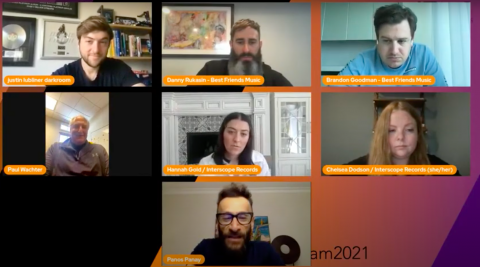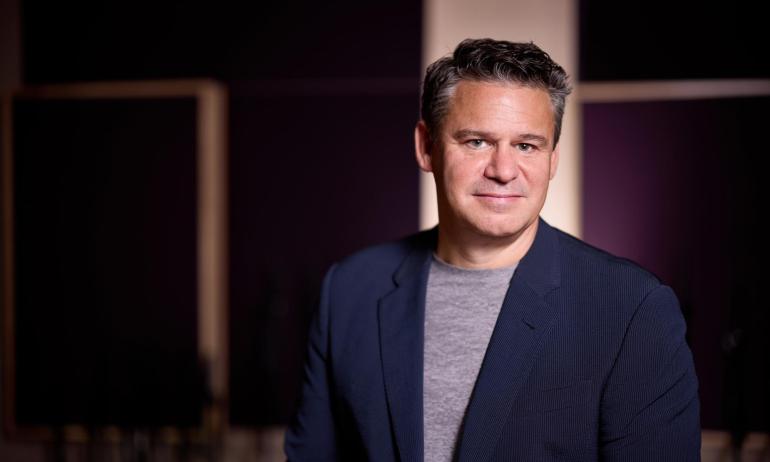Team Billie Eilish to Independent Artists: Start with Singles and a Plan

Billie Eilish
Image by Lars Crommelinck/Wikimedia Commons
Earlier this week, Billie Eilish made headlines by announcing that her greatly anticipated sophomore album, Happier Than Ever, will be available July 30. She also dispensed a third single from the record, as part of a slow-drip, momentum-building campaign that began July 30 of last year, when the album’s first tune, “My Future,” dropped.
Nothing about this timed-release approach is arbitrary, nor is any other aspect of Eilish’s promotion, as was evident when her tightly knit marketing and management team appeared at Berklee’s Career Jam earlier this month to talk about how they helped one of music's freshest voices achieve extraordinary success.

During the event, the team—which included Paul Wachter, CEO of Main Street Advisors; Justin Lubliner, CEO of the Darkroom; Chelsea Dodson, manager of creative at Interscope; Eilish’s managers, Danny Rukasin and Brandon Goodman, from Best Friends Music; and Hannah Gold, vice president of marketing for Interscope—discussed a host of topics:
- The importance of artist authenticity
- What makes an artist stand out
- How to best use social media
- NFTs (non fungible tokens)
- How to get the attention of a label
- The evolving role of a label
- How an artist’s team influences their success
- Their reaction to the Billie Eilish documentary
Singles or an Album?
Toward the end of the panel discussion, which was moderated by Panos A. Panay, Berklee’s senior vice president for Global Strategy and Innovation, student Maksym Pisotskyi asked the group about the strategy it appears to have used to promote Eilish’s upcoming album: “Is it better to release an album or try things out with a single release, for an independent artist?” Here’s an edited version of what they had to say:
Lubliner: For an independent artist, one thousand million percent single release. It's incredibly hard to get a full project, each individual song, recognized. You might have a shot at one of those songs in the project becoming big and then the other songs getting, you know, 1,000 to 2,000 streams, and then you kind of just threw everything you had at the wall and only one stuck.
I think, to build a fan base, slowly tiering out songs, in an organized fashion, with having as much creative assets as you can—with having a visual narrative, covering all your social media platforms—and giving each song its own priority and attention and a shot, and then [you begin] slowly building into a project-based artist.
Ultimately, to break as an artist, you need to have albums, you need to have a project that people can listen to from start to finish to get to the next level, and we saw that again and again with Billie. But I feel like to give your music your best shot, you have to tier them out slightly, because each song could be that one song that takes it over the edge.
“We're in an attention economy, and people don't even have the ability to listen to more than, like, a minute of a song. So, forcing 25 minutes on people early on, it's a little bit too aggressive.”
—Danny Rukasin
Goodman: And you're creating more moments by doing so that way as well. But it’s just better in general: you're louder that way, there's more potential press moments.
Lubliner: But if the song does catch, you want to quickly have music available. The last thing you want is to have one or two songs out and one catch and then you don't have other music for a year. That's also a huge issue.
Gold: It’s important that you have singles, for sure, but then also that you have the year planned out. You know what song is coming next, you have the assets ready to go, and that you're just consistently releasing, driving back to your project.
Lubliner: You have to really take it one at a time as an independent artist. The rules change once you have a huge following. The biggest mistake some people make when they release music one at a time is not having anything prepped. I feel like you should have five to six songs banked before you start releasing music, and then start to just think about how you're doing it. If you just throw songs out without any plan, it can quickly catch up [to] you and you can find yourself in a very dangerous situation, especially if you do start getting recognized by fans and labels and partners, [and] everyone is focused on what's next.
Rukasin: We're in an attention economy, and people don't even have the ability to listen to more than, like, a minute of a song. So, forcing 25 minutes on people early on, it's a little bit too aggressive at the beginning.
Gold: Every moment where you're releasing a new song you're driving back to the whole catalogue, so you're giving those other songs another chance to be heard, maybe from a new audience.
Lubliner: But when you start to tour, you need to have a body of work out. So when you start to tier your singles out, if you have shows coming up, that's a perfect time to start having a project on the platforms because that's when you'll have new fans wanting to listen to you and go through your body of work. And if you only have two singles out, it makes it a little bit dangerous.
Watch the whole discussion here:











